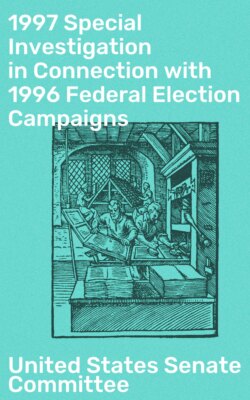Читать книгу 1997 Special Investigation in Connection with 1996 Federal Election Campaigns - United States Senate Committee - Страница 12
На сайте Литреса книга снята с продажи.
Footnotes
ОглавлениеTable of Contents
1 S.Res. 54, Section 13(d)(1), 143 Congressional Record S1421 (daily ed. Feb. 13, 1997). 2 See 143 Congressional Record S716–18 (daily ed. Jan. 28, 1997). 3 No deadline on the special investigation was proposed. 4 The three additional minority members of the Committee opposed the resolution by proxy, but proxy votes are not counted on a motion to report a measure to the Senate from the Committee. Rule 3C, Rules of the Committee on Governmental Affairs. See 143 Congressional Record S1195 (daily ed. Feb. 10, 1997) (reprinting the Committee Rules). 5 See S.Rep. 105–7, Report of the Committee on Governmental Affairs to Accompany S.Res. 39, p. 3. 6 S.Res. 54 was approved by the Senate by unanimous consent on February 13, 1997. 143 Congressional Record S 1418 (daily ed. Feb. 13, 1997). 7 See 143 Congressional Record S1195 (daily ed. Feb. 10, 1997) (reprinting the Committee Rules). 8 See S.Rep. 105–7, Report of the Committee on Governmental Affairs to Accompany S.Res. 39, Authorizing Expenditures by the Committee on Governmental Affairs. 9 See Amendment No. 22, as modified. 143 Congressional Record S2097 (daily ed. March 11, 1997). 10 See 143 Congressional Record S2109 (daily ed. March 11, 1997). 11 Id. at S2114. 12 Id. at S2125. 13 See S.Res. 89. 143 Congressional Record S4915 (daily ed. May 21, 1997). 14 The DNC even attempted to protect information by asserting the attorney-client privilege both over document production and in depositions based on discussions between the DNC witnesses and White House officials, including White House lawyers. In a June 6, 1997 order, Chairman Thompson overruled the assertion of the attorney-client privilege as to discussions between DNC officials and White House lawyers. 15 The Committee sought permission to send staff to the People’s Republic of China (PRC) to interview witnesses there, but the PRC refused to issue visas to Committee staff for the purpose of conducting fact-gathering within the PRC. Accordingly, no staff traveled to the PRC. 16 The investigation into the Teamsters has broadened and media reports indicate that the second-ranking figure of the AFL-CIO, Richard Trumka, has invoked his Fifth Amendment right against self-incrimination in response to the grand jury. Trumka simply ignored a Committee subpoena seeking his deposition testimony, and the reason for that is now obvious: he wanted to delay the embarrassment to organized labor of having one of its most senior officials assert his Fifth Amendment rights. 17 The Committee heard from 70 different witnesses; two witnesses appeared twice. 18 Although investigative hearings on the political activities of non-profit groups were not held, the activities of some of these groups were outlined during the Committee’s policy hearings in September.
